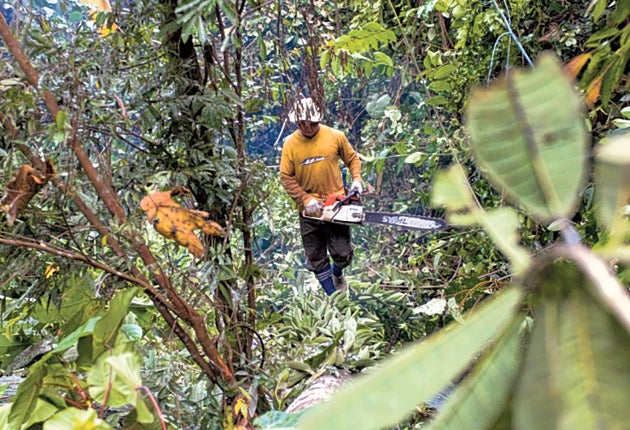Fight for the Borneo rainforest: Gordon Brown celebrates the role of journalist Clare Rewcastle

Your support helps us to tell the story
From reproductive rights to climate change to Big Tech, The Independent is on the ground when the story is developing. Whether it's investigating the financials of Elon Musk's pro-Trump PAC or producing our latest documentary, 'The A Word', which shines a light on the American women fighting for reproductive rights, we know how important it is to parse out the facts from the messaging.
At such a critical moment in US history, we need reporters on the ground. Your donation allows us to keep sending journalists to speak to both sides of the story.
The Independent is trusted by Americans across the entire political spectrum. And unlike many other quality news outlets, we choose not to lock Americans out of our reporting and analysis with paywalls. We believe quality journalism should be available to everyone, paid for by those who can afford it.
Your support makes all the difference.I have a declaration of interest to make at the outset. Clare Rewcastle is my sister-in-law. She is also a journalist who has had a lifelong fascination with the environment. She was busy raising a family – and was not hunting for the next big exposé. But, as she researched into the community where she had been brought up, she stumbled upon what is probably the biggest environmental crime of our times.
Clare was born in Sarawak, a small state on the island of Borneo, and for the first eight years of her life, she attended the local primary school. She subsequently moved to the UK, and eventually became a journalist. Because of her connection to the country and track record covering green issues, she was invited to speak at an environment conference in Sarawak in 2005. After she addressed the meeting she was surrounded by local journalists and people pleading for help in publicising the plight of their country.
She knew that Sarawak was being deforested – over-logged – losing a full square mile a day. She also knew that Sarawak's rate of depletion was estimated to be the fastest and worst in the world.
As one of the few outsiders keenly interested in Sarawak's fate she then started to take a deeper interest in what was happening in the state. She found out about and then spoke to the Bruno Manser Foundation, a Swiss charity set up in memory of a Swiss environmentalist. As early as the 1980s, Manser had tried to draw the attention of the world to what was happening in Sarawak.
He engineered blockades, the plan being to hold up the lorries taking logs illegally stolen from the area. Manser had captured some international attention with his campaign, but ten years ago, in 2000, he mysteriously disappeared while in the jungle. Suspicions abound – but no one was able to discover what had happened to him.
Clare's starting point was not suspicion of foul play, but simply a desire as a reporter to apply normal UK-style investigative journalism to events in Malaysia. But since her first forays into what has happened to the forests she has become persona non grata in Malaysia. She is now harassed whenever she visits the country. She has been told she is on a blacklist and will be watched. She has received death threats.
Nevertheless she has moved beyond just writing articles and in June 2010 set up a blog – www.sarawakreport.org – that answers the region's need for news and explanation of what is happening. In December last year she also set up a radio station broadcasting similar facts and news to local people.
The cause that is so big and threatening is the wanton destruction of what was once the world's best-preserved forest, the Borneo forest on both sides of the Indonesia-Malaysian border. This deforestation is responsible for more toxic emissions than the pollution spewed into the atmosphere by all the airlines in the world. In fact the Borneo rainforest, while once the best preserved of the world's top three forests, is smaller than only the Amazon and the Congo basin. The rate of depletion is extraordinary: only five per cent of the primary forest is left where it was nearly 100 per cent untouched in the 1960s.
What Clare Rewcastle is exposing through her local informants is that over this period, particularly during the 1980s, Malaysia's once vast pristine jungle has been stripped bare and enormous areas have been planted with oil palm in an environmental nightmare that shows no sign of slowing. Deprived of their livelihoods, some of the world's poorest people have been further impoverished by the deforestation.
The recent Sarawak Report exposes how pressures continue to force families to leave the forests and give up on their traditional livelihoods. These families are being pressed to accept "compensation", often of only £80, for land whose wood is worth millions.
The courage being shown by local Sarawak people gives us all a chance to stop the destruction. If the world fails now we are not guilty simply of a sin of omission; we will be actively condoning the destruction of a nation's future by people too greedy to see the trees for the wood.
Gordon Brown is the former Prime Minister. This series concludes tomorrow with the Russian journalist Anna Politkovskaya.
Join our commenting forum
Join thought-provoking conversations, follow other Independent readers and see their replies
Comments